Receive ENBOTS Meeting Reports |
||
|
Receive our ENBOTS bulletins and reports by email: |
||

| Follow @enbclimate | ||

Loading... |
||
|
Receive emailed updates with the news articles above plus related information and announcements from our CLIMATE-L community mailing list: |
||
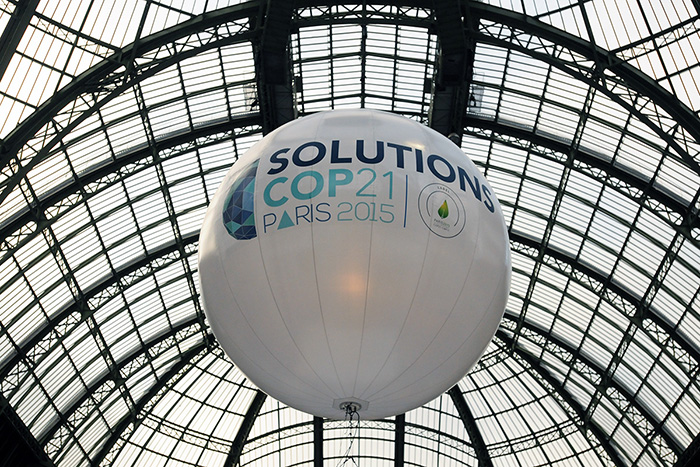 Solutions COP 21 Paris 2015 Exhibits at le Grand Palais
Solutions COP 21 Paris 2015 Exhibits at le Grand Palais
|
The following side events were covered by ENBOTS on Friday, 11 December 2015:
|
||
|
IISD Reporting Services, through its ENB on the Side (ENBOTS) Meeting Coverage, is providing web coverage, including photos and video, of an average of nine daily side events from the Paris Climate Change Conference - November-December 2015. | ||
The Joint Crediting Mechanism: Achievements and Recent Progress of Project Implementation Presented by: Global Environment Center Foundation (GEC), and Overseas Environmental Cooperation Center (OECC), Japan
This side event, moderated by Makoto Kato, OECC, reported on recent progress on the implementation of the Joint Crediting Mechanism (JCM), discussing recent developments with representatives from JCM partner countries.
Yuji Mizuno, Ministry of the Environment, Japan (MOEJ), noted progress in the COP 21 negotiations regarding market mechanisms and quoted Japanese Prime Minister Shinzō Abe saying: “Many of the advanced low-carbon technologies do not generally promise investment return to developing countries. Japan, will, while lowering burdens of those countries, promote diffusion of advanced low-carbon technologies, particularly through implementation of the JCM.” He further provided an overview of JCM partner countries, model projects and projects at the implementation stage, which provide tangible examples of emissions reductions and technology transfer.
Dicky Edwin Hindarto, Indonesia JCM Secretariat, noted 20 current projects in Indonesia, three of which are already registered with the JCM. He underscored benefits beyond the investments, which include knowledge transfer in emissions reduction using high-technology measures and technology transfer among different sectors. He highlighted the measurement, reporting and verification (MRV) System, related guidelines and methodologies, and JCM infrastructure, pointing to further potential for JCM project implementation.
Takaaki Ito, MOEJ, highlighted, inter alia: the importance of partner countries sharing opinions and comments for better project implementation; the establishment of an efficient, uncomplicated and inexpensive JCM registry in Japan, which will issue credits in the future; and the JCM’s contribution in the context of Japan's Intended Nationally Determined Contribution (INDC).
Osamu Bannai, GEC, noted that despite the difficulties regarding project implementation, 40 JCM model projects are currently implemented. He highlighted the feasibility studies program, saying that it is open to the public through their website.
Noriko Hase, Japan International Cooperation Agency (JICA), stressed that JCM projects in Indonesia have a broader policy perspective, and highlighted JICA’s efforts to address linkages between: the JCM and other mitigation policies; the national Indonesian registry and the JCM registry; and MRV national regulations and the JCM MRV system.
Focusing on Costa Rica, Jiro Ogahara, OECC, noted a common denominator with Indonesia, as the JCM is considered part of a broader strategy to make Costa Rica climate neutral by 2021. He stressed the need for an updated technological needs assessment to identify the kind of projects and technologies that are suitable for Costa Rica, stressing the country’s potential.
In the ensuing discussion, participants addressed, inter alia: research to analyze JCM activities; additionality properties in JCM projects; access to the support scheme; separation of credits between Japan and partner countries; project cost limitations and timelines; and the future of the JCM.
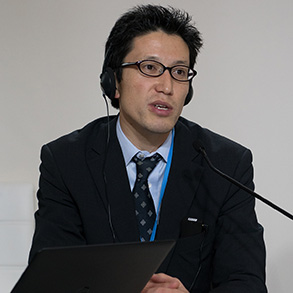 Stressing the collaborative nature of the JCM, Takaaki Ito, MOEJ, noted that the initial “J” does not stand for “Japan”, but for “Joint.”
Stressing the collaborative nature of the JCM, Takaaki Ito, MOEJ, noted that the initial “J” does not stand for “Japan”, but for “Joint.”
| 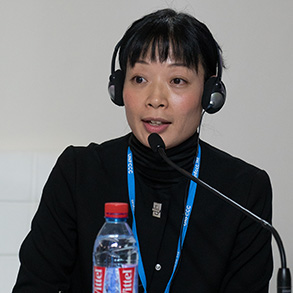 Noriko Hase, JICA, noted Indonesia is a leading country with regard to the JCM.
Noriko Hase, JICA, noted Indonesia is a leading country with regard to the JCM.
| 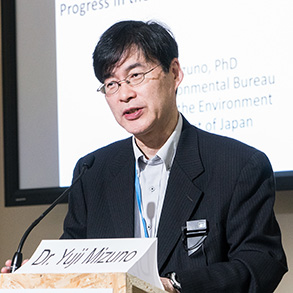 Yuji Mizuno, MOEJ, underscored that JCM’s basic concept involves the facilitation of diffusion of leading low-carbon technologies, products, systems, services and infrastructure and the implementation of mitigation activities.
Yuji Mizuno, MOEJ, underscored that JCM’s basic concept involves the facilitation of diffusion of leading low-carbon technologies, products, systems, services and infrastructure and the implementation of mitigation activities.
|
 Panel (L-R):
Yuji Mizuno, MOEJ; Dicky Edwin Hindarto, Indonesia JCM Secretariat; Jiro Ogahara, OECC; Noriko Hase, JICA; and Osamu Bannai, GEC.
Panel (L-R):
Yuji Mizuno, MOEJ; Dicky Edwin Hindarto, Indonesia JCM Secretariat; Jiro Ogahara, OECC; Noriko Hase, JICA; and Osamu Bannai, GEC.
|
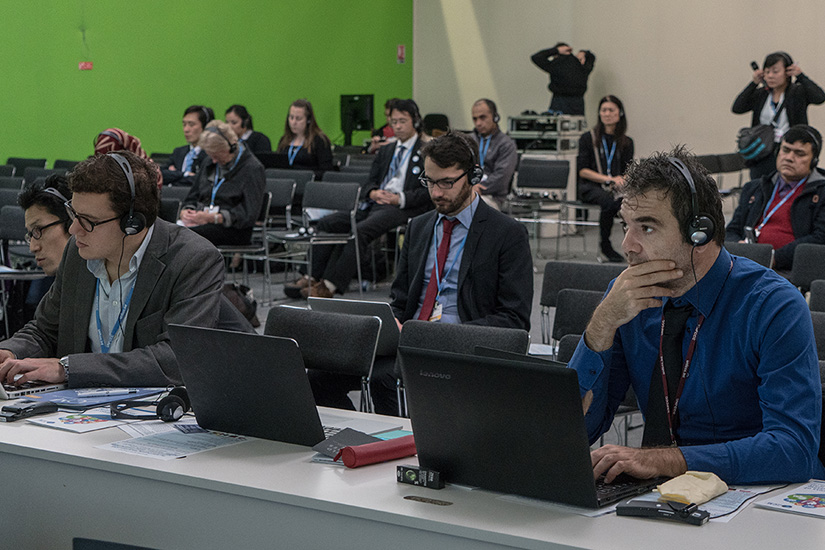
|
Contacts:
- Osamu Bannai (Coordinator) | bannai@gec.jp
- Jiro Ogahara (Coordinator) | ogahara@oecc.or.jp
More Information:
Emissions Reduction Potential from Green Building and Beyond Presented by: Delta Electronics Foundation
This event was moderated by Angela Yeh, Delta Electronics Foundation.
In his keynote speech, Bruce Cheng, Founder and Honorary Chairman, Delta Electronics, highlighted his company’s work in green architecture, noting that Delta has built and donated a number of green buildings to schools and universities. He highlighted the opening of two buildings in China and the US, reporting on their energy savings of up to 73%. He noted that although it will not be easy to achieve the goals set out in the Paris agreement, the world should commit to do so to prevent human extinction.
Dinghuan Shi, President, China Renewable Energy Society (CRES), spoke on the importance of green buildings in reducing carbon emissions. He reported on projects undertaken with Delta to develop environmentally-friendly green architecture, including a programme to construct green buildings in Sichuan Province following the 2008 earthquake, highlighting the use of green materials to reduce energy intensity. Observing the hundreds of renewable energy projects being developed in China, he noted the government’s commitment to low-carbon development for sustainability and reduced air pollution.
Maria Zuber, Vice President for Research, Massachusetts Institute of Technology (MIT), underscored MIT’s efforts to: use education and research to understand the threat of climate change and identify solutions; and renew the campus and renovate the buildings to make them more sustainable. She underscored the need for a carbon price, using shadow pricing in the campus, and highlighted a study on end-user carbon pricing to influence behavior.
Robert Yang, Industrial Technology Research Institute, presented six cutting edge technologies to increase energy efficiency in domestic and industrial applications, including: battery energy storage using aluminium ion technology; organic LED; side-lighting building generated photovoltaic; an active magnetic-bearing chiller; a direct heating compressed air dryer; and low-cost calcium looping carbon capture.
Stressing that time is running out to address climate change, Yancey Hai, Chairman, Delta, reported on studies showing that energy efficiency is the most cost-effective response measure, capable of saving the equivalent of four times the electricity generated annually by the world’s largest coal-fired power plant, with only 1% improvement. He detailed Delta’s achievement of improving energy efficiency by 50% between 2009 and 2014, indicating the goal for a further 30% improvement by 2020.
Zhong Jishou, China National Engineering Research Center for Human Settlements, noted that urbanization rates in China have increased from 20% in 1980 to almost 55% in 2014, posing a serious challenge for climate action and sustainable development. He cited examples of green buildings in China, including in schools, and highlighted, inter alia: the solar building design competition; efforts to educate students on green building concepts; the Climate, Harmonious, Energy, Economic, Renewable (CHEER) system; and systems of design, including micro-climate design, functional zoning, passive design, natural ventilation, and vertical greening and green roofs.
Shirish Garud, TERI, spoke on energy efficiency measures in India, highlighting government schemes to promote capital investments that will inject financing into the green buildings sector. He drew attention to the country’s efficient building energy code, and highlighted India’s commitment to reducing energy consumption by 30-40%.
In the discussion, participants briefly considered the need for collaboration among the building and construction industry and national and local governments to ensure that green technologies reach the market.
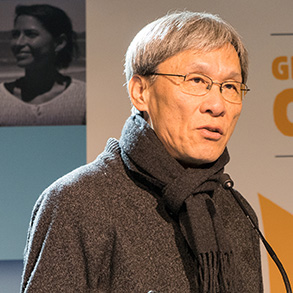 Robert Yang, Industrial Technology Research Institute, noted that technology plays a crucial role in mankind’s ability to combat climate change.
Robert Yang, Industrial Technology Research Institute, noted that technology plays a crucial role in mankind’s ability to combat climate change.
| 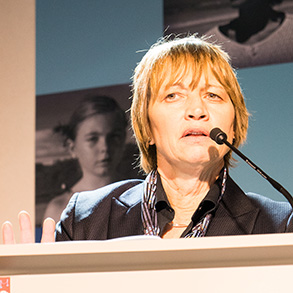 Maria Zuber, Vice President for Research, MIT, emphasized the need for engagement and cooperation among academic institutions, governments and industry.
Maria Zuber, Vice President for Research, MIT, emphasized the need for engagement and cooperation among academic institutions, governments and industry.
| 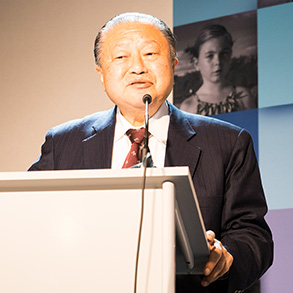 Bruce Cheng, Founder and Honorary Chairman, Delta Electronics, noted that his company decided to invest in the development of switching power supplies, having recognized the low energy efficiency of linear power supply.
Bruce Cheng, Founder and Honorary Chairman, Delta Electronics, noted that his company decided to invest in the development of switching power supplies, having recognized the low energy efficiency of linear power supply.
|
 Panel (L-R):
Bruce Cheng, Founder and Honorary Chair, Delta; Dinghuan Shi, President, CRES; Maria Zuber, Vice President for Research, MIT; Robert Yang, Industrial Technology Research Institute; Joshua Jih Pan, Fellow, American Institute of Architects; Yancey Hai, Chair, Delta; and Shirish Garud, Associate director, TERI.
Panel (L-R):
Bruce Cheng, Founder and Honorary Chair, Delta; Dinghuan Shi, President, CRES; Maria Zuber, Vice President for Research, MIT; Robert Yang, Industrial Technology Research Institute; Joshua Jih Pan, Fellow, American Institute of Architects; Yancey Hai, Chair, Delta; and Shirish Garud, Associate director, TERI.
|
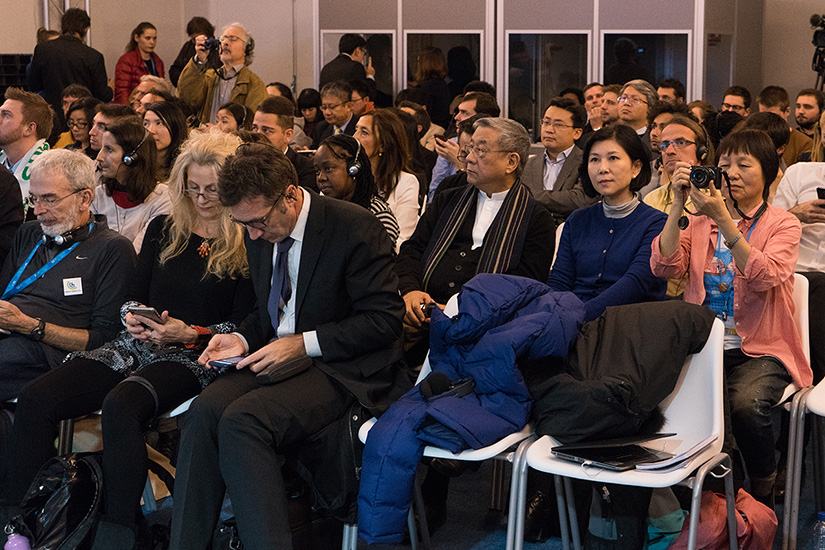
|
Contacts:
- Angela Yeh, Delta Electronics Foundation (Coordinator) | angela.yeh@delta-foundation.org.tw
More Information:
International Mountain Day: Celebrating International Cooperation on Climate Change Adaptation in Mountain Environments - from Rio to Lima to Paris Presented by: Consortium for the Sustainable Development of the Andean Eco region (CONDESAN), UN Environment Programme (UNEP), GRID-Arendal, Swiss Agency for Development and Cooperation (SDC)
Moderator Barney Dickson, UNEP, opened the session that considered the important role of mountains and cooperative measures in ecosystem-based approaches to climate change adaptation in mountainous regions.
Anil Mishra, UNESCO, showed a video for the exhibition ‘Mountains: Early Warning Systems for Climate Change,’ and presented UNESCO’s International Hydrological Programme (IHP) project: ‘Addressing Water Security: Climate Impacts and Adaptation responses in Africa, the Americas, Asia and Europe.’
Matthias Jurek, GRID-Arendal, and Tina Schoolmeester, GRID-Arendal, launched several publications on regional outlooks on mountains and climate change adaptation, and presented findings of the Ecosystem-Based Adaptation Mountain Flagship Programme. Schoolmeester highlighted key recommendations applying to all regions, including: the need for more data collection on the mountain-specific impacts of climate change; and the “very high need” to strengthen regional cooperation among mountain areas.
David Molden, International Centre for Integrated Mountain Development (ICIMOD), launched the Himalayan Climate and Water Atlas, underscoring key messages, including: overall rainfall in the area is likely to increase by 25-30%; extreme rainfall events are likely to be less frequent but more intense; and glaciers will continue to suffer “substantial” losses.
In a panel session, Rolf Einar Fife, Norwegian Ambassador to France, indicated that Norway’s careful water management was key to the country’s prosperity, underscoring the need for an integrated and cooperative approach. Stana Božović, State Secretary, Ministry of Agriculture and Environmental Protection, Serbia, said that her country is committed to urgent adaptation actions, and supported improving regional cooperation.
Lyonpo Yeshey Dorji, Minister of Agriculture and Forests, Bhutan, underscored that addressing implementation would be more beneficial than producing a report, and hoped that the Green Climate Fund (GCF) would fairly share resources to allow climate change issues to be addressed in the least developed countries (LDCs). Petr Kalaš, Chief Adviser to the Minister, Ministry of Environment, Czech Republic, stressed that mountains are early warning systems for climate change, and reiterated the importance of cooperation to share information and experiences.
Flavia Nabugera Munaaba, State Minister for the Environment, Uganda, supported a special Intergovernmental Panel on Climate Change (IPCC) report on mountains, and said there was a need to develop special mechanisms for addressing mountain problems such as shrinking glaciers and threatened resources. Monika Mörth, Cabinet of the Federal Minister, Ministry of Agriculture, Forestry, Environment and Water Management, Austria, appeared on behalf of Andrä Rupprechter, Federal Minister of Agriculture, Forestry, Environment and Water Management of Austria, who stated: “We must ensure that people remain able to make a living in all remote mountain areas. Therefore we need regional collaborations and networks to share experiences and exchange know-how.” Mörth supported cooperative sub-regional and holistic approaches to climate change adaptation in mountain areas.
Kuban Kabaev, Ministry of Foreign Affairs, Kyrgyzstan, reported on his country’s sustainable development mountain agenda, and noted concern on the negative climate change impacts on biodiversity, particularly on snow leopards. In closing remarks, Andrew Taber, Executive Director, The Mountain Institute, and Chair, Mountain Partnership Steering Committee, underscored the excellent work shown by the publications launched at the event in helping billions of people around the world that depend on mountains.
In a statement, Achim Steiner, Executive Director, UNEP, noted that mountain ecosystems enrich the lives of over half of the world’s population as a source of water, energy, agriculture and other essential goods and services. He however lamented that while the impact of climate change is accentuated at high altitude, such regions are often on the edge of decision-making, partly due to their isolation, inaccessibility and relative poverty.
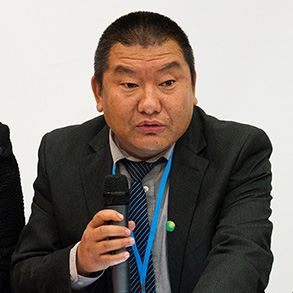 Lyonpo Yeshey Dorji, Minister of Agriculture and Forests, Bhutan, stated his support for greater cooperation on knowledge sharing and technical capacity building.
Lyonpo Yeshey Dorji, Minister of Agriculture and Forests, Bhutan, stated his support for greater cooperation on knowledge sharing and technical capacity building.
| 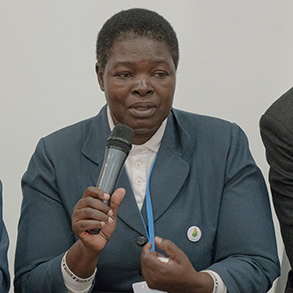 Flavia Nabugera Munaaba, State Minister for the Environment, Uganda, underscored the importance of sharing local knowledge with others to combine the knowledge of different cultures to help people adapt.
Flavia Nabugera Munaaba, State Minister for the Environment, Uganda, underscored the importance of sharing local knowledge with others to combine the knowledge of different cultures to help people adapt.
| 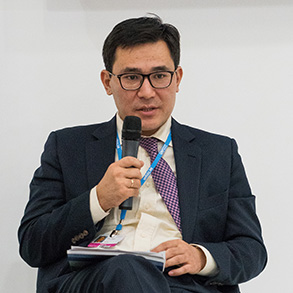 Kuban Kabaev, Ministry of Foreign Affairs, Kyrgyzstan, expressed interest in learning from international experiences on developing mines without negatively impacting mountains.
Kuban Kabaev, Ministry of Foreign Affairs, Kyrgyzstan, expressed interest in learning from international experiences on developing mines without negatively impacting mountains.
|
 Panel (L-R):
Rolf Einar Fife, Ambassador to France, Norway; Stana Božović, State Secretary, Ministry of Agriculture and Environmental Protection, Serbia; Lyonpo Yeshey Dorji, Minister of Agriculture and Forests, Bhutan; Petr Kalaš, Chief Adviser to the Minister, Ministry of Environment, Czech Republic; Flavia Nabugera Munaaba, State Minister for the Environment, Uganda; Barney Dickson, UNEP; Monika Mörth, Cabinet of the Federal Minister, Ministry of Agriculture, Forestry, Environment and Water Management, Austria; and Kuban Kabaev, Ministry of Foreign Affairs, Kyrgyzstan
Panel (L-R):
Rolf Einar Fife, Ambassador to France, Norway; Stana Božović, State Secretary, Ministry of Agriculture and Environmental Protection, Serbia; Lyonpo Yeshey Dorji, Minister of Agriculture and Forests, Bhutan; Petr Kalaš, Chief Adviser to the Minister, Ministry of Environment, Czech Republic; Flavia Nabugera Munaaba, State Minister for the Environment, Uganda; Barney Dickson, UNEP; Monika Mörth, Cabinet of the Federal Minister, Ministry of Agriculture, Forestry, Environment and Water Management, Austria; and Kuban Kabaev, Ministry of Foreign Affairs, Kyrgyzstan
|
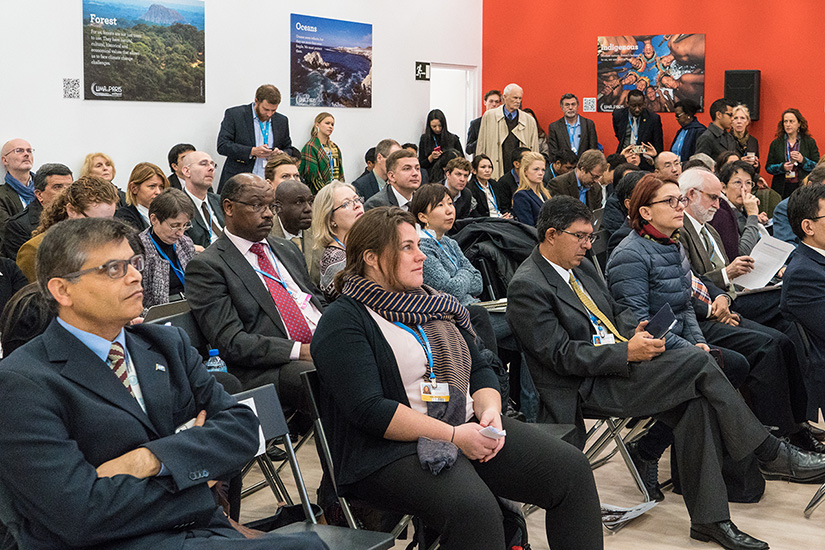
|
Contacts:
- Matthias Jurek, UNEP (Coordinator) | matthias.jurek@unvienna.org
- Miguel Saravia, CONDESAN (Coordinator) | miguel.saravia@condesan.org
More Information:
Preparing for the Action Plans on Post-2020 Climate Change Regime in Asia Presented by: Climate Change Center, Freie Universität Berlin (FUB), Center for Climate and SD Law and Policy of Seoul International Law Academy (CSDLAP)
This event was moderated by Suh-Yong Chung, Climate Change Center.
In his opening remarks, Duck-Soo Han, Chair of the Board of Directors, Climate Change Center, and Former Prime Minister, Republic of Korea, highlighted the need to address the free-rider problem that characterizes climate change, noting the need for a new climate regime as well as stronger cooperation and partnerships in Asia to combat climate change. He called for enhanced financial and technological resources to ensure that addressing climate change will not be at the cost of growth and better living standards.
Haibin Zhang, Member of the Global Advisory Board of CSDLAP, presented on Chinese President Xi Jinping’s approach to climate change and the environment, stressing that for the first time climate change is considered a political, security and moral issue and not just a sustainable development one. He highlighted the President’s policy on green development, and drew attention to the initialization of the country’s first nation-wide carbon trading system, noting these initiatives as part of Jinping’s commitment to a legacy of environmental protection.
John Byrne, University of Delaware, presented findings from a six-city study on the “financeability of large scale solar.” Byrne described results from London, Munich, New York City, Seoul, Tokyo, and Amsterdam, noting the need for further work on the cost of installations in Seoul and Tokyo to enable the upscaling of rooftop photovoltaic (PV) which would, in turn, attract sufficient investment to further the project.
Oliver Lah, FUB, spoke on climate action through the Sustain EU-ASEA partnership which, he noted, focuses on developing concrete proposals to spur action on climate through results sharing and research. He highlighted efforts to create synergies between the research and development communities, drawing attention to a handbook for research cooperation for climate change in South East Asia, and twinning projects on, inter alia, wetlands, climate change and resource efficiency, which link Europe and South East Asia.
Richie Ahuja, Regional Direct for Asia, Environmental Defense Fund, highlighted clean energy and clean cooking systems as low-carbon solutions, and noted their multiple co-benefits including for health, women and livelihoods. He also discussed the need to enhance and maintain food security levels, and underscored the importance of resource efficiency in agricultural practices which can enhance water savings, reduce emissions and increase yield profitability.
In the ensuing discussion, participants considered, inter alia, the nature of the economies in rural areas to encourage uptake of clean cooking tools and clean energy; the fact that the Paris agreement is the beginning of implementation negotiations; the need to build inter-ministerial capacities in order implement low-carbon development; and the importance of including Asian businesses in discussions on a low-carbon future.
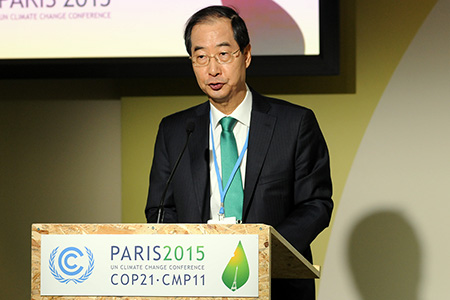 Duck-Soo Han, Chair of the Board of Directors, Climate Change Center, and Former Prime Minister, called for public and private sector stakeholders to deliver the message of decoupling the reduction of emissions from economic growth.
Duck-Soo Han, Chair of the Board of Directors, Climate Change Center, and Former Prime Minister, called for public and private sector stakeholders to deliver the message of decoupling the reduction of emissions from economic growth.
| 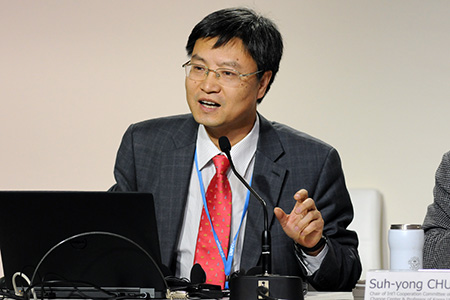 Haibin Zhang, Member of the Global Advisory Board of CSDLAP, called on Asian countries to strengthen the epistemic community on environmental and development, share city-to-city best practices, and encourage people-to-people exchanges.
Haibin Zhang, Member of the Global Advisory Board of CSDLAP, called on Asian countries to strengthen the epistemic community on environmental and development, share city-to-city best practices, and encourage people-to-people exchanges.
|
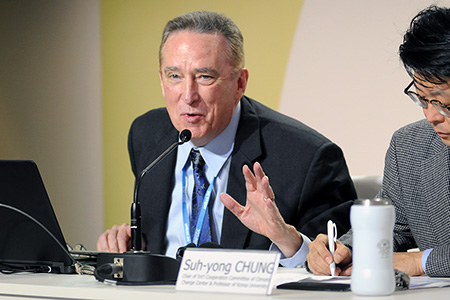 John Byrne, University of Delaware, described a large-scale solar financing project which aims to create a financing authority in each country to assemble all rooftop PV projects to a scale that a capital market can price effectively.
John Byrne, University of Delaware, described a large-scale solar financing project which aims to create a financing authority in each country to assemble all rooftop PV projects to a scale that a capital market can price effectively.
| 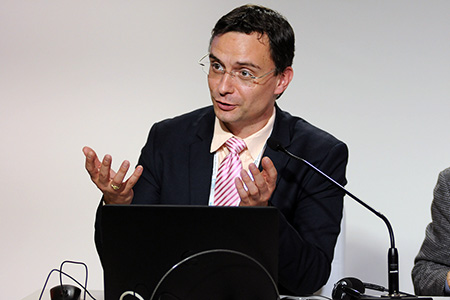 Oliver Lah, FUB, highlighted a gap analysis to find out what has been covered by European studies on climate action in South East Asia.
Oliver Lah, FUB, highlighted a gap analysis to find out what has been covered by European studies on climate action in South East Asia.
|
 Panel (L-R):
Suh-Yong Chung, Climate Change Center; Haibin Zhang, Member of the Global Advisory Board of CSDLAP; John Byrne, University of Delaware; Oliver Lah, FUB; and Richie Ahuja, Regional Direct for Asia, Environmental Defense Fund.
Panel (L-R):
Suh-Yong Chung, Climate Change Center; Haibin Zhang, Member of the Global Advisory Board of CSDLAP; John Byrne, University of Delaware; Oliver Lah, FUB; and Richie Ahuja, Regional Direct for Asia, Environmental Defense Fund.
|
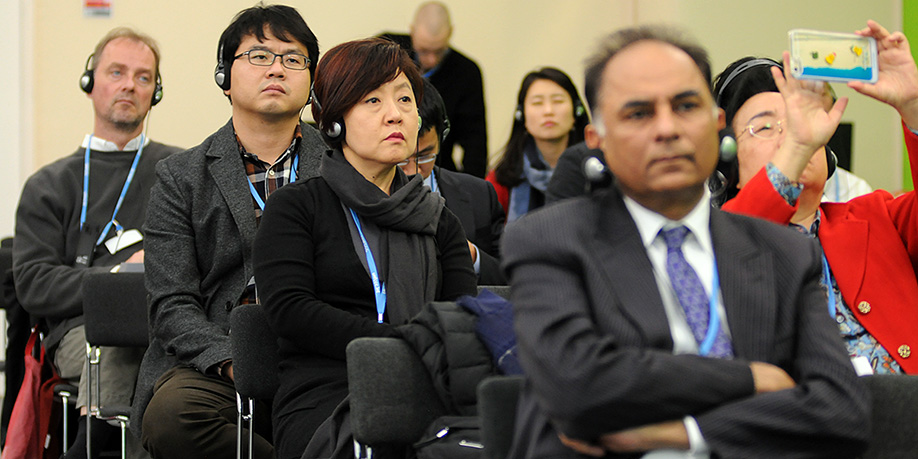
|
Contacts:
- SoHee Kim, CBE (Coordinator) | info@climatechangecenter.kr
- Alokananda Mukherjee, FUB (Coordinator) | alokanandab@gmail.com
- Oliver Lah, FUB (Coordinator) | oliver.lah@wupperinst.org
- Suh-yong Chung (Coordinator) | mahlerchung@gmail.com
More Information:
Climate Law and Governance: Future Practices and Prospects Presented by: Centre for International Sustainable Development Law (CISDL), Ateneo de Manila University (ADMU) and National Council for Climate Change, Sustainable Development and Public Leadership (NCCSD)
This event was chaired by Marie-Claire Cordonier Segger, CISDL, who asked panelists to discuss: top priorities for advancing international law and governance on climate change; the most important steps to achieve the goal of the Paris agreement; and examples of practices that are most useful to implement commitments on the ground.
Victoria Tauli-Corpuz, UN Special Rapporteur on the Rights of Indigenous Peoples, emphasized the importance of references to human rights and to the rights of Indigenous Peoples in the Paris agreement, urging operationalization of the link between climate change and human rights to ensure justice and equity. She pointed to Indigenous Peoples’ forest stewardship as an example of best practice to address climate change, human rights and sustainable development in a synergistic fashion.
Noting time lags between science and policy for selected environmental issues, Jacqueline McGlade, UN Environment Programme (UNEP), pointed to the need for greater clarity on how we handle risk in a fair and just way.
Hafij Kahn, Director, Center for Climate Justice, Bangladesh, underscored the need to understand the nature of loss and damage and to ensure its institutionalization in the Paris agreement. He lamented that international climate governance is shifting away from substantive commitments, and does not provide avenues to address compensation and liability, underscoring the need to address these at the national level, with international support.
Stuart Bruce, CISDL, reflected on the role of trade and investment law in addressing climate change, calling for tackling regime incompatibilities, creating adequate environments to facilitate climate-friendly investment, and more harmonized climate and energy laws.
Stressing the difficulty of coming to an agreement in Paris, Antonio Gabriel La Viña, Dean, Ateneo School of Governance, expressed satisfaction with the preambular reference to human rights in the draft agreement text, noting acceptance for it is now almost universal. He called for greater understanding of the nature of obligations parties are taking on, noting the issues of differentiation and loss and damage as the most contentious.
Participants then heard reports from the floor, sharing national-level experiences in Chile, Brazil, Pakistan, Peru, and Taiwan.
Katherine Lofts, CISDL, announced the launch of the Climate Law And Governance Day, inviting actors to join this new forum and build momentum for the future.
Ensuing discussions addressed, inter alia: climate change litigation, and the role of statutory litigation; backtracking from hard law to soft law commitments under the climate regime; and the polluter pays principle, and loss and damage.
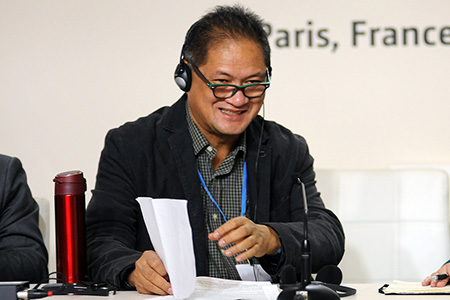 Antonio Gabriel La Viña, Dean, Ateneo School of Governance, commented on the status of negotiations and outstanding issues.
Antonio Gabriel La Viña, Dean, Ateneo School of Governance, commented on the status of negotiations and outstanding issues.
| 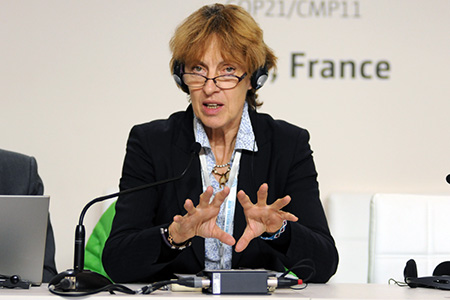 Jacqueline McGlade, UNEP, called for greater clarity on how to handle risk in a way that is fair and just.
Jacqueline McGlade, UNEP, called for greater clarity on how to handle risk in a way that is fair and just.
|
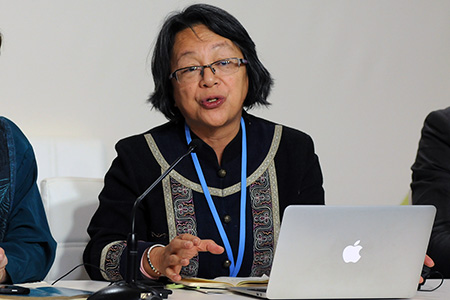 Victoria Tauli-Corpuz, UN Special Rapporteur on the Rights of Indigenous Peoples, called for operationalizing the link between climate change and human rights to ensure justice and equity.
Victoria Tauli-Corpuz, UN Special Rapporteur on the Rights of Indigenous Peoples, called for operationalizing the link between climate change and human rights to ensure justice and equity.
| 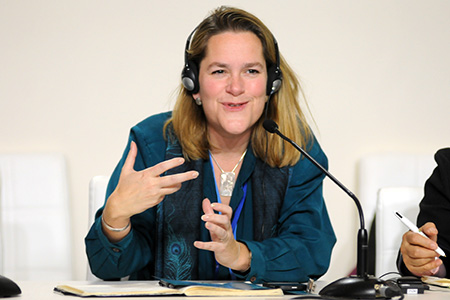 Marie-Claire Cordonier Segger, CISDL, chaired the event.
Marie-Claire Cordonier Segger, CISDL, chaired the event.
|
 Panel (L-R):
Christopher Campbell-Duruflé, CISDL; Hafij Kahn, Director, Center for Climate Justice, Bangladesh; Antonio Gabriel La Viña, Dean, Ateneo School of Governance; Marie-Claire Cordonier Segger, CISDL; Victoria Tauli-Corpuz, UN Special Rapporteur on the Rights of Indigenous Peoples; and Stuart Bruce, CISDL.
Panel (L-R):
Christopher Campbell-Duruflé, CISDL; Hafij Kahn, Director, Center for Climate Justice, Bangladesh; Antonio Gabriel La Viña, Dean, Ateneo School of Governance; Marie-Claire Cordonier Segger, CISDL; Victoria Tauli-Corpuz, UN Special Rapporteur on the Rights of Indigenous Peoples; and Stuart Bruce, CISDL.
|
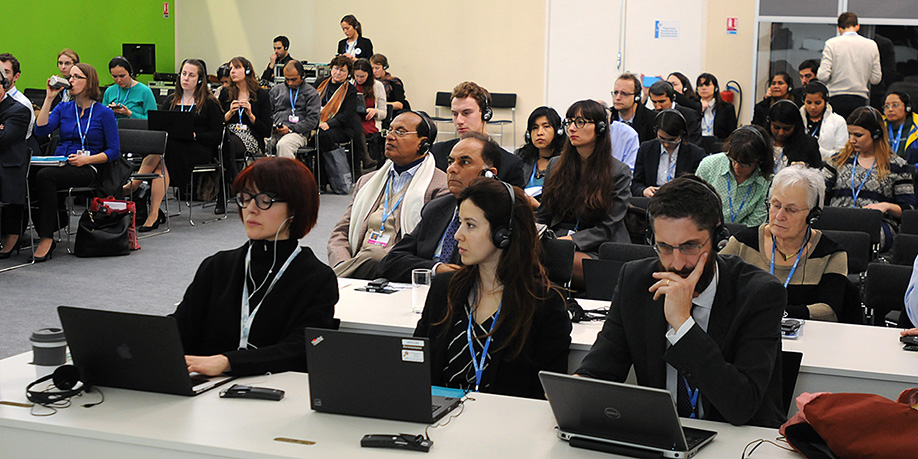
|
Local Action Driving Transformation: Insights from the ICCA2015
Local climate action is a multi-level challenge. This event was sharing proceedings of the International Conference on Climate Action, held in Hanover, Germany, Oct 2015, and resulting in the (“Hanover Declaration: Local Action Driving Transformation”).
ICCA2015 focused on local climate action pioneers, and the necessary enabling frameworks and strategies at the sub-national, national and international levels.
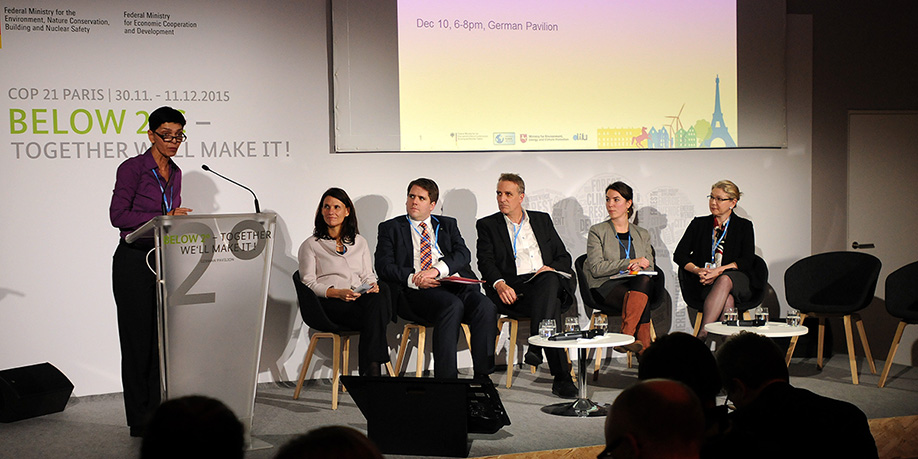 Panel (L-R):
Minu Hemmati, Senior Associate, adelphi;
Rita Schwarzelühr-Sutter, Parliamentary State Secretary, Ministry for the Environment, Nature Conservation, Building and Nuclear Safety, Germany;
Marian Zachow, Municipal Councillor, Region of Marburg-Biedenkopf, Germany;
Stefan Wenzel, Minister for Environment, Energy
and Climate Mitigation, Lower Saxony, Germany;
Julie Laernoes, Vice-President of Nantes Metropole and Councillor of the City of Nances, France;
and
Mary Polak, Minister of Environment, British Columbia, Canada.
Panel (L-R):
Minu Hemmati, Senior Associate, adelphi;
Rita Schwarzelühr-Sutter, Parliamentary State Secretary, Ministry for the Environment, Nature Conservation, Building and Nuclear Safety, Germany;
Marian Zachow, Municipal Councillor, Region of Marburg-Biedenkopf, Germany;
Stefan Wenzel, Minister for Environment, Energy
and Climate Mitigation, Lower Saxony, Germany;
Julie Laernoes, Vice-President of Nantes Metropole and Councillor of the City of Nances, France;
and
Mary Polak, Minister of Environment, British Columbia, Canada.
|
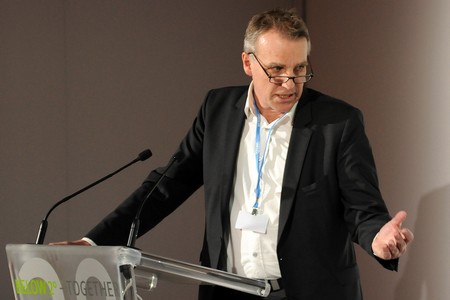 Stefan Wenzel, Minister for Environment, Energy
and Climate Mitigation, Lower Saxony, Germany
Stefan Wenzel, Minister for Environment, Energy
and Climate Mitigation, Lower Saxony, Germany
| 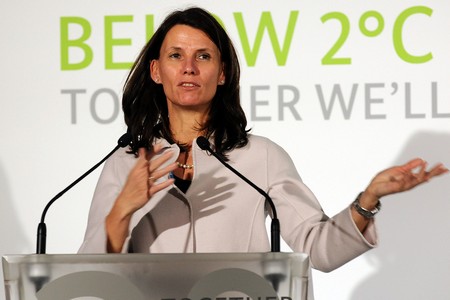 Rita Schwarzelühr-Sutter, Parliamentary State Secretary, Ministry for the Environment, Nature Conservation, Building and Nuclear Safety, Germany
Rita Schwarzelühr-Sutter, Parliamentary State Secretary, Ministry for the Environment, Nature Conservation, Building and Nuclear Safety, Germany
|
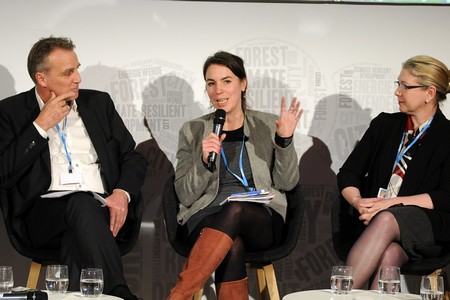 Julie Laernoes, Vice-President of Nantes Metropole and Councillor of the City of Nances, France
Julie Laernoes, Vice-President of Nantes Metropole and Councillor of the City of Nances, France
| 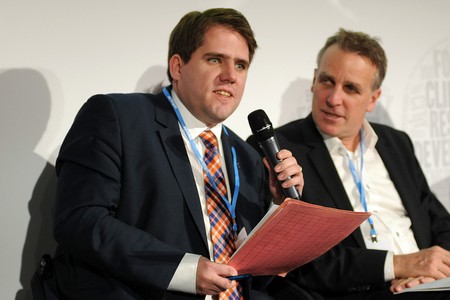 Marian Zachow, Municipal Councillor, Region of Marburg-Biedenkopf, Germany
Marian Zachow, Municipal Councillor, Region of Marburg-Biedenkopf, Germany
|
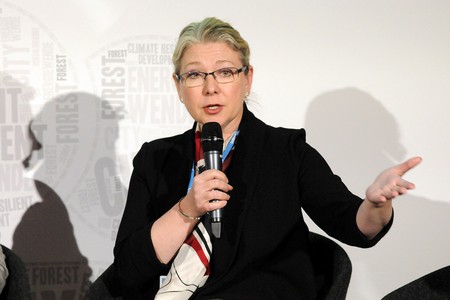 Mary Polak, Minister of Environment, British Columbia, Canada
Mary Polak, Minister of Environment, British Columbia, Canada
| 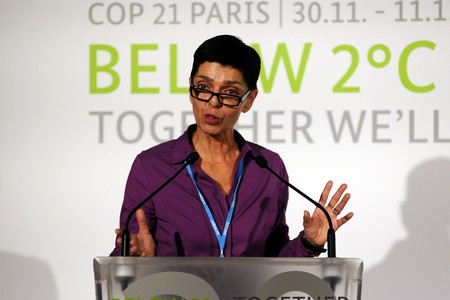 Minu Hemmati, Senior Associate, adelphi
Minu Hemmati, Senior Associate, adelphi
|
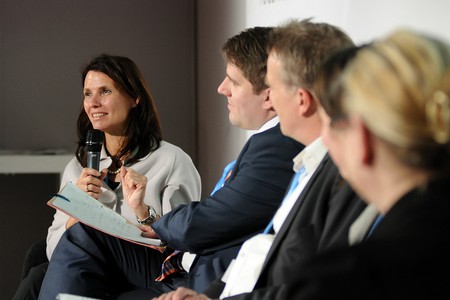
| 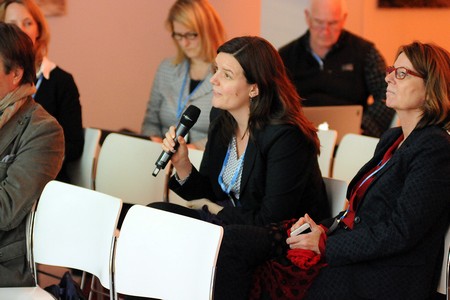
|
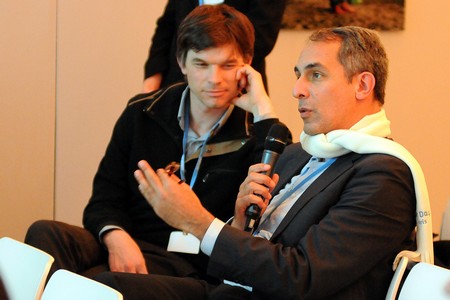
| 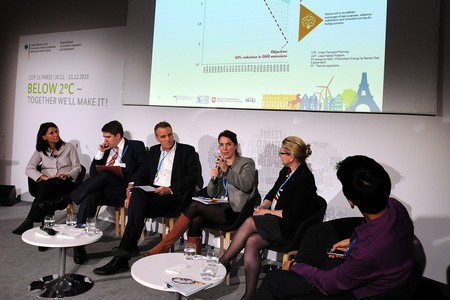
|
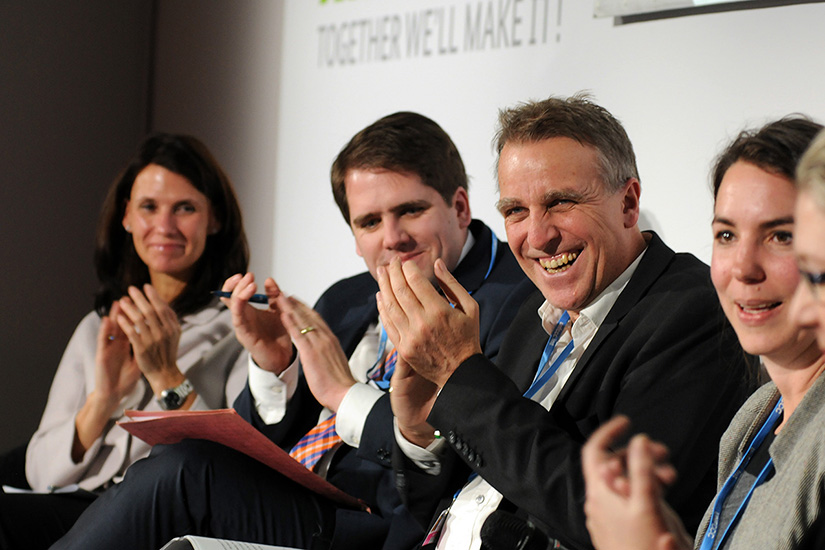
|
Solutions COP 21 Paris 2015 Exhibits at le Grand Palais
 Monaco / Venturi
Monaco / Venturi
|
 Delta 21
Delta 21
| 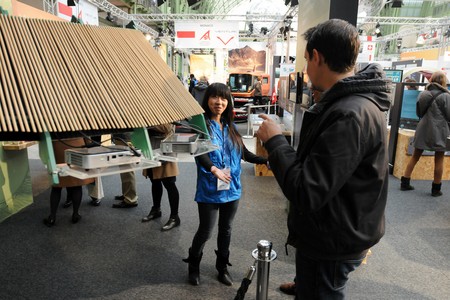
|
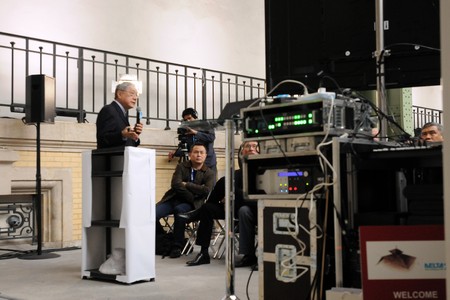
| 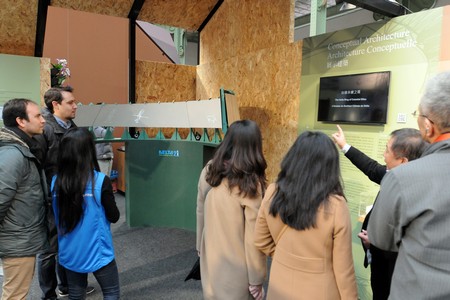
|
 Cité lib / Toyota
Cité lib / Toyota
| 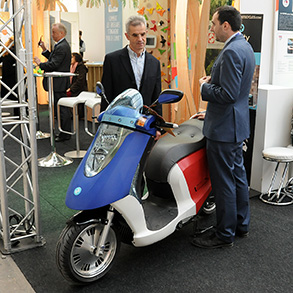 EC City
EC City
|  Conseil National des Professions de l’Automobile (CNPA)
Conseil National des Professions de l’Automobile (CNPA)
|
 Pragma Industries
Pragma Industries
| 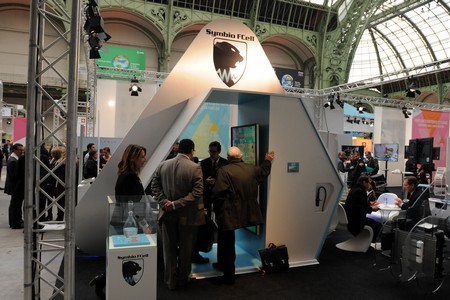 Symbio FCell
Symbio FCell
|
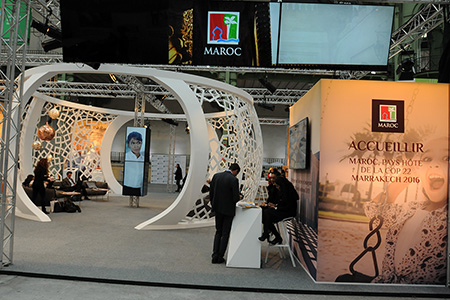 Maroc
Maroc
| 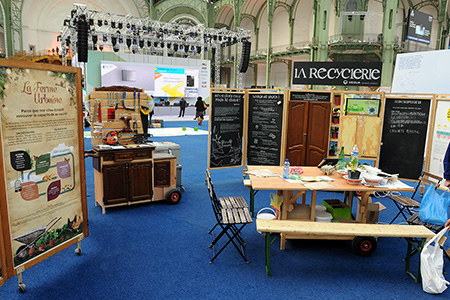 Veolia / La REcyclerie
Veolia / La REcyclerie |
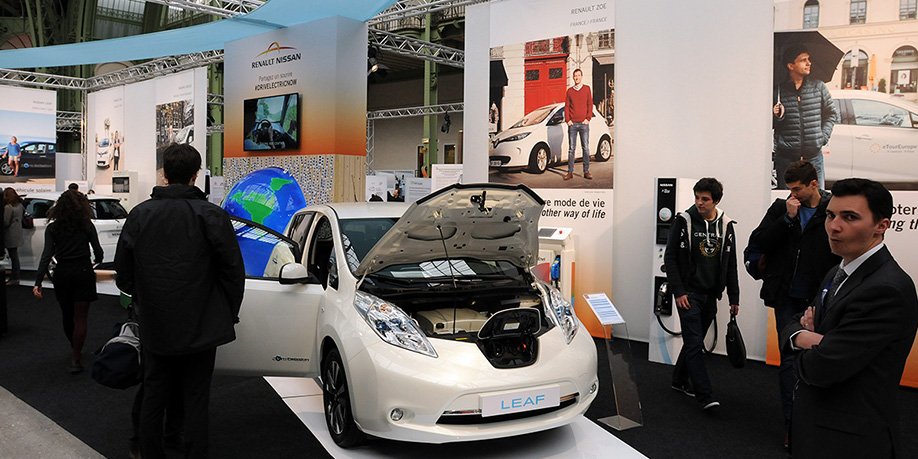 Renault / Nissan
Renault / Nissan
|
 Veolia
Veolia
|  Terres OléoPro
Terres OléoPro
| 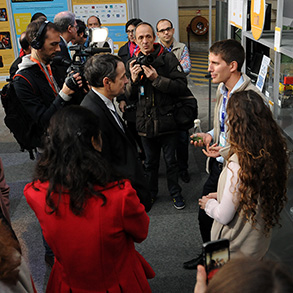 |
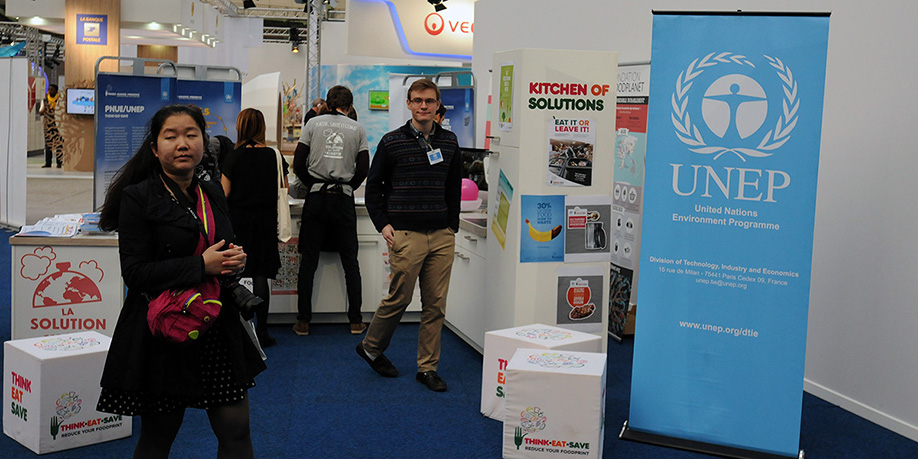 UNEP
UNEP
|
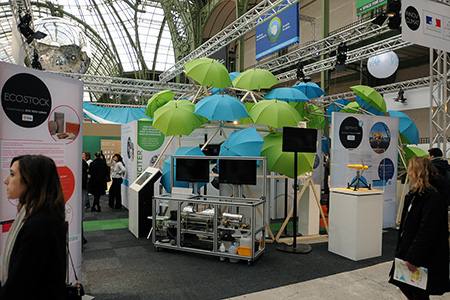 Ecostock
Ecostock
|  L'Oréal
L'Oréal
|
 Engie
Engie
| 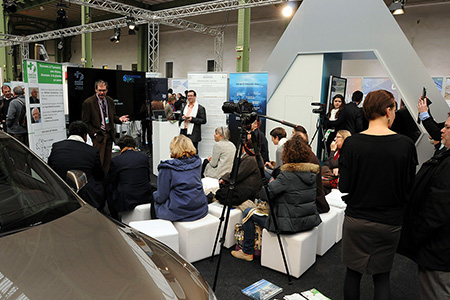 Green Cross
Green Cross
|
 PIXEL CARRÉ/ KISSKISS GAME
PIXEL CARRÉ/ KISSKISS GAME
|
 Virtual tours
Virtual tours
| 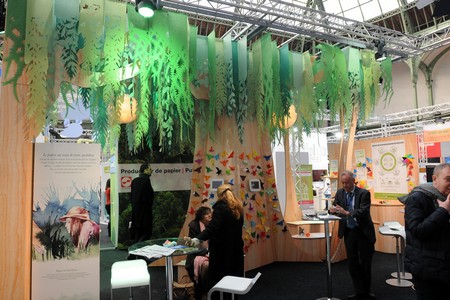 Carbon Artik
Carbon Artik
|
 Created by Nature, Protected by Man, film by Jérôme Bouvier
Created by Nature, Protected by Man, film by Jérôme Bouvier
|  Avril
Avril
|
 Avril
Avril
|
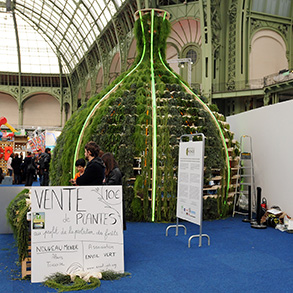 Nouveau Monde
Nouveau Monde
|  Antarctic 13.3
Antarctic 13.3
| 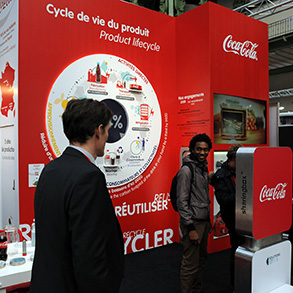 Coca-Cola
Coca-Cola
|

|
The Earth Negotiations Bulletin on the Side (ENBOTS) © <enb@iisd.org> is a special publication of the International Institute for Sustainable Development (IISD). This issue has been written by Lynn Finnegan, Tallash Kantai, Gillian Nelson, Ph.D., Annalisa Savaresi, Ph.D., and Asterios Tsioumanis, Ph.D. The Digital Editors are Naomi Devine and Brad Vincelette. The Editor is Dan Birchall <dan@iisd.org>. The Director of IISD Reporting Services is Langston James “Kimo” Goree VI <kimo@iisd.org>. The Sustaining Donors of the Bulletin are the European Union, the Government of Switzerland (the Swiss Federal Office for the Environment (FOEN), the Swiss Agency for Development and Cooperation (SDC)), and the Kingdom of Saudi Arabia. General Support for the Bulletin during 2015 is provided by the German Federal Ministry for the Environment, Nature Conservation, Building and Nuclear Safety (BMUB), the New Zealand Ministry of Foreign Affairs and Trade, SWAN International, the Finnish Ministry for Foreign Affairs, the Japanese Ministry of Environment (through the Institute for Global Environmental Strategies - IGES), the United Nations Environment Programme (UNEP), and the International Development Research Centre (IDRC). The opinions expressed in ENBOTS are those of the authors and do not necessarily reflect the views of IISD and funders. Excerpts from ENBOTS may be used in non-commercial publications only with appropriate academic citation. For permission to use this material in commercial publications, contact the Director of IISD Reporting Services at <kimo@iisd.org>. Electronic versions of issues of ENBOTS from the Paris Climate Change Conference - November 2015, can be found on the IISD Reporting Services website at http://enb.iisd.org/climate/cop21/enbots/. The ENBOTS Team at the Paris Climate Change Conference - November 2015, can be contacted by e-mail at <tallash@iisd.org>. |
||
|
IISD Reporting Services is grateful to the many donors of the Earth Negotiations Bulletin (ENB) and recognizes the following as core contributors to the ENB: the European Union, the Finnish Ministry for Foreign Affairs, the German Federal Ministry for the Environment, Nature Conservation, Building and Nuclear Safety (BMUB), the International Development Research Centre (IDRC), the Japanese Ministry of Environment (through the Institute for Global Environmental Strategies - IGES), the New Zealand Ministry of Foreign Affairs and Trade, the Kingdom of Saudi Arabia, SWAN International, Government of Switzerland (the Swiss Federal Office for the Environment (FOEN), the Swiss Agency for Development Cooperation (SDC), and the United Nations Environment Programme (UNEP). Funding for translation of the Bulletin into French is provided by the Government of France, the Wallonia, Québec, and the International Organization of La Francophonie/Institute for Sustainable Development of La Francophonie (IOF/IFDD). |
||